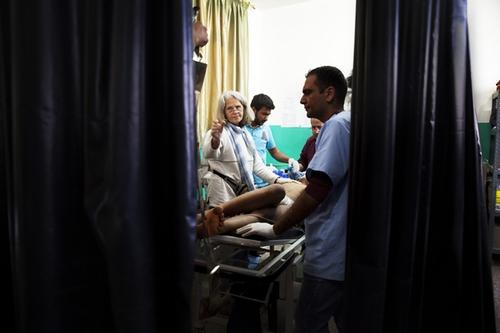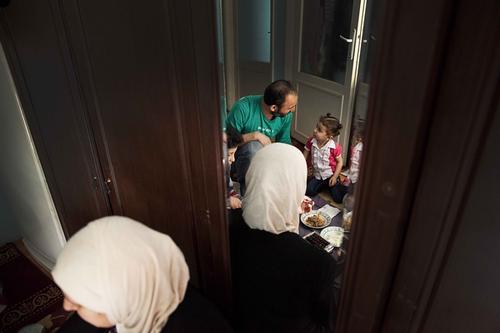This is the third chapter of the Syrian Exodus, an MSF multimedia project to follow the route of Syrians fleeing the war. See chapter one and two.
Lawand Deek exits the internet café after a few hours of virtual chatting. Consumed by boredom, he wanders the streets of Athens until he finds solace sitting on a bench.
“At the beginning I was very optimistic because I left Syria and Turkey. People say that if you arrive to Greece it’s very easy to go to Europe, but that wasn’t right,” says the 21-year-old Syrian. “It’s hard to go to a European country.”
He speaks as if Greece wasn’t a member country of the European Union. After almost half a year living in Athens with no job or foreseeable future, Lawand has been overtaken by disappointment, despite being a young enthusiast who keeps a diary of his exodus and even toys with the idea of writing a book. If he does so, his experience in the past few months is not likely to be a source of literary inspiration.
“I think Syrian refugees should stay in Turkey. It’s better than coming here and trying to go to another country,” he says, visibly irritated. “In Turkey you can find a job, and maybe the war will be over soon.”
Where does this frustration come from? Most of his dreams have evaporated. Born in Kabane, in northeastern Syria, Lawand was always interested in travelling abroad to countries such as Canada or Russia. He soon started learning English to search for a future outside the boundaries of his country. But when the war started and the clashes erupted in the Ar-Raqqah province, where he used to live, he made the final decision to go.
He crossed the border and spent most of the month of April in Turkey, where he got in touch with people smugglers. His idea was to move to Europe, so he went to the western Turkish city of Izmir and, from there, he boarded a small boat with 24 other Syrians to reach the Greek island of Lesvos.
“The Greek police saw us from their ship. We were afraid that they would take us back to Turkey,” he says. “But finally they helped us to reach the island.”
Once in Lesvos, and after being arrested for a few hours, the police issued them with a certificate allowing them to stay in Greece for six months. Lawand and his travel companions were free and took the first ferry to Athens.
Almost six months have gone by since then. Lawand is living in Athens with a Syrian who offered him a room for free. He dyed his hair. He only gets money from some family members in Syria and elsewhere in the Middle East.
“I can’t work here because I have to speak Greek,” he complains. “I looked for a job and asked a lot of people to find me a job, but it has been impossible.”
He doesn’t have many acquaintances in the neighbourhood, so he spends a lot of time in the internet café chatting with family and friends. “My parents connect to the internet from Syria, close to the Turkish border. Normally I talk to them in the evening.”
Distracted, Lawand mechanically names his daily routines. “I go to the internet café. At home, I watch TV. Sometimes I cook,” he says, unmoved. Lawand does not hide that his dream is to go abroad, to the United Kingdom or Canada, so he can study a master’s in business administration, but his current situation makes him doubt his future.
“I tried everything and everything is hard. I failed. So I still don’t know how I will leave.” The only thing he’s clear about is that he won’t try to get out irregularly from Greece by boat. “It’s very dangerous,” says Lawand, who describes the death of migrants off Lampedusa as “tragic”.
The young Syrian speaks slowly, fatigue in his every word. Only occasionally does his face regain the bright happiness of that distant spring morning when he arrived by boat to Athens.
“After failing so many times to get out of here and having lost a lot of money, I’m disappointed,” he admits. “But I’ve still got some hope.”
During 2012 7,927 apprehensions of Syrians for irregular stay and entry were recorded by the Greek police. In the first 9 months of 2013, the influx of refugees fleeing the Syrian conflict remained constant, with a total of 5,623 arrivals.
MSF is running a primary healthcare programme in Athens and a project to assist the migrants in three detention centres located in Evros region. In 2012, the humanitarian organisation also launched a response on the islands of the Aegean Sea.




